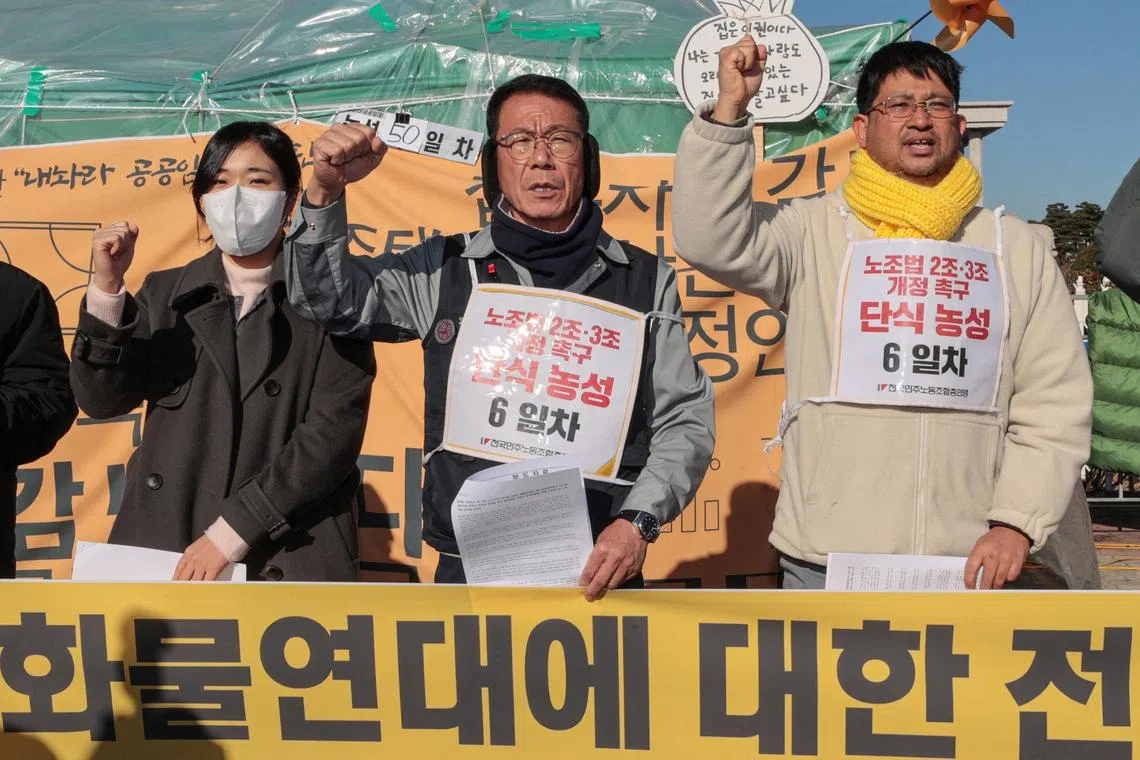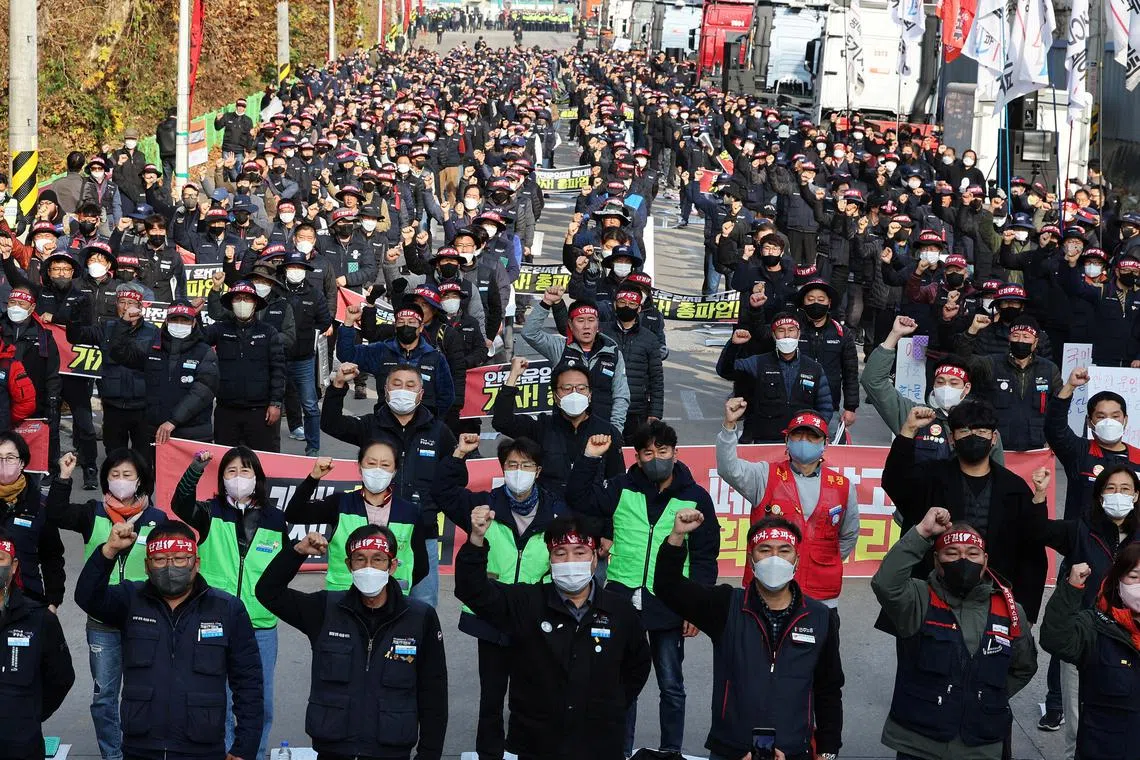Major Korean Union joins truckers’ protest as strike broadens
Sign up now: Get insights on Asia's fast-moving developments

Protesters gather in support of the ongoing strike by truckers in Seoul on Dec 5.
PHOTO: REUTERS
SEOUL/UIWANG - A major umbrella union joined a protest by South Korean truckers, broadening a work stoppage that is disrupting global supply chains and hitting local exporters.
The Korean Confederation of Trade Unions will stage demonstrations at 16 places on Tuesday at 2pm local time to support striking truck drivers, according to the union’s website. The union, which has about 1 million members including metal workers in autos, shipbuilding and chip industries, did not disclose how many participants will be at the protests.
Calling for better wage systems since Nov 24,
Starting Monday, the trade ministry will ask shipping companies and cargo owners whether their truck drivers are following the government’s orders, the ministry said in a statement Sunday night. The truckers’ union said it will continue the protests, blaming the government for “violently cracking down on strikes.”
South Korea President Yoon Suk-yeol’s approval rating rose for the second week amid his hard-line stance on the strike, a survey from Realmeter showed. Mr Yoon compared the truckers’ strike to “a threat like North Korea’s nuclear activities”, Yonhap News Agency reported, citing a recent meeting between the president and top officials.
Inside five white tents outside the Uiwang container depot near Seoul, about 200 striking truckers huddle around gas heaters, trying to fight the bitter cold and the government narrative that they are well paid “labour aristocracy”.
They are all too aware of the impact their strike has had on South Koreans at a time of record inflation. But these drivers, and tens of thousands of others striking across the country, say their calls for stronger minimum pay protections are all that stand between them and poverty.
“We are not the enemy. We are loyal to our country, because we are contributing to exports,” said Mr Kim Young-chan, a 63-year-old container truck driver transporting exports such as home appliances and cosmetics between Uiwang and Busan port. “Our money is stretched to eat and live for a month. Labour aristocracy? That is nonsense.”
Amid soaring fuel costs, as many as 25,000 truckers are calling on the government for a permanent minimum-pay system known as the “Safe Freight Rate”, which was introduced temporarily in 2020 for a small portion of the more than 400,000 truckers.
President Yoon has said his administration would not give in to what it calls “unjustified demands” by the truckers union as the second major strike in less than six months disrupts supplies of cars, cement and fuel.
Pale and unshaven, the drivers venture out of their tents a couple of times a day to chant slogans and hand out leaflets.
Mr Kim said high diesel prices mean their lives are no better than in June, when they went on an eight-day strike. He earns about 3 million won (S$3,120) per month, far less than last year because diesel prices have nearly doubled.
The country’s consumer prices also jumped 5 per cent in November compared with a year earlier.
Mr Kim said it broke his heart that his wife, who is past retirement age, must work to support the family, mopping floors and cooking for pay.
“Maybe our life can be better if freight rates are stable,” he said.
The government and the union have sat down for talks twice but remain far apart on two key issues: extending the minimum pay rules beyond the end of this year and expanding them to benefit more truckers.
The government has specifically said it will not expand minimum pay protection to truckers in the fuel and steel industries, saying they are already well paid.
Concerns are mounting over shortages of petrol and pricier groceries causing economic pain.
Ms Lee Ji-eun, 36, a physician and mother of two, said she hurried to fuel up her car on Thursday over shortage fears.
“I want the government and the truckers to reach a deal as soon as possible. Strikes like this or by subway workers or public officials - that damage is done straight to ordinary people like me,” Ms Lee said.

South Korean truckers have been calling for better wage systems since Nov 24.
PHOTO: REUTERS
Early in the strike, near a major oil storage facility that supplies petrol stations in Seoul, a dozen striking tanker drivers had positioned their trucks to hamper traffic. On Thursday, they stopped after residents complained.
“I know people are getting cold about this strike, and they are like, ‘Why again?‘“ said Mr Ham Sang-jun, 49, a driver transporting oil from top refiner S-Oil Corp to petrol stations.
Along with Mr Ham, about 90 per cent out the 340 tanker drivers contracted to supply S-Oil’s products have walked off the job, according to Mr Lee Geum-sang, their union leader.
Their families worry they may lose their jobs.
Mr Ham, the father of two teens, earns about 3 million to 4 million won a month working 12 hours a day, five days a week, often overnight and weekends. That is 2 million won less than last year because of fuel costs.
“I am sorry to my wife and children, because I am not a good father,” he said. “But we have to keep up the strike for a better future 10 years ahead.” BLOOMBERG, REUTERS


